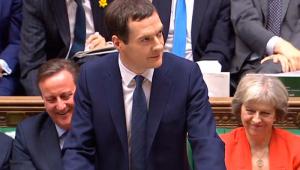
End goal: Liverpool mayor Joe Anderson wants the city to grab the opportunity offered by George Osborne to have more autonomy. Photo: Shutterstock
Speaking to Public Finance after the chancellor revealed only councils and combined authorities that appoint mayors will be given additional powers during the next parliament, Newcastle City Council leader Nick Forbes warned against an ‘obsession’ with one model of governance.
Eight cities, including Newcastle upon Tyne, have rejected mayors in referendums in 2012, he said. ‘We know that one-size-fits-all doesn’t work, and what is good for Greater Manchester may well not be good for Newcastle or Bristol or Sheffield. That’s why we have to continue with bespoke deals [similar to the City Deals in the last parliament]. Otherwise, the government will set impossibly high hurdles that can’t be overcome in some places.
‘There is a danger that the devolution agenda gets sidelined in a debate about whether mayors are a good idea,’ added Forbes. ‘Devolution is about far more than the governance of it – it’s about rebalancing power and how do we reverse the trend of centralisation over the last three or four decades.’
Forbes’ comments came after Osborne set out his plans for devolution to create a so-called Northern Powerhouse through strong cities and improved connectivity across the region. Speaking in Manchester on 14 March, the chancellor said elected mayors are needed to provide the accountability and leadership for devolution.
He said his door is open to any major city in England that wants to create a mayor to take on powers similar to Manchester, which has reached two deals since agreeing to create a mayor for its combined authority last November. First came agreement to devolve powers and funding for transport, housing, and skills, followed by a pledge to localise the conurbation’s NHS budgets.
Legislation to introduce these changes will be in the Queen’s Speech on May 27 in a City Devolution Bill, Osborne said.
‘This law will pave the way for Greater Manchester – and, importantly, other cities as well – to take greater control and responsibility over all the key things that make a city work, from transport and housing to skills, and key public services like health and social care.
‘Other cities can find the mayoral model that works for them. But it has to involve a city-wide elected executive mayor.’
This is now a requirement for further devolution, Osborne insisted. ‘I’m not interested in any more half-way house deals. We will transfer major powers only to those cities who choose to have a directly elected metro-wide mayor.’
Forbes, who also leads on public service reform for the Core Cities Group of the UK’s 10 largest cities outside London, said differences around the country ought to be respected. ‘For us, in the Northeast, devolution of the business support area would probably be a priority above even devolution of the NHS.’
Another core city leader, Nottingham City Council chief Jon Collins, confirmed that requiring directly-elected city leaders will be a barrier to the revolution in governance that Osborne wants.
Both Nottingham and Nottinghamshire councils have worked hard to put together a combined authority for the area, including working with district councils governed by different political parties, he said. ‘I know, absolutely, that if the requirement becomes that we have to have a mayor then that will fall apart – we will not be able to put together a proposition for a directly-elected mayor.’
By contrast Joe Anderson, who runs Liverpool City Council as an executive mayor, told Public Finance that Osborne has set out the deal for local areas, and it is now up to cities to respond. He wants the powers offered to Manchester to be offered to Liverpool and its city region and is ‘happy to engage’ with the chancellor.
‘I’m quite relaxed about what he said – the end goal for me is the opportunity for Liverpool to have more fiscal responsibility and for more powers to be devolved to the Liverpool city region,’ Anderson said. ‘I think it is a chance, if people want to grasp it, to get more control and be able to do things for themselves locally.’





















